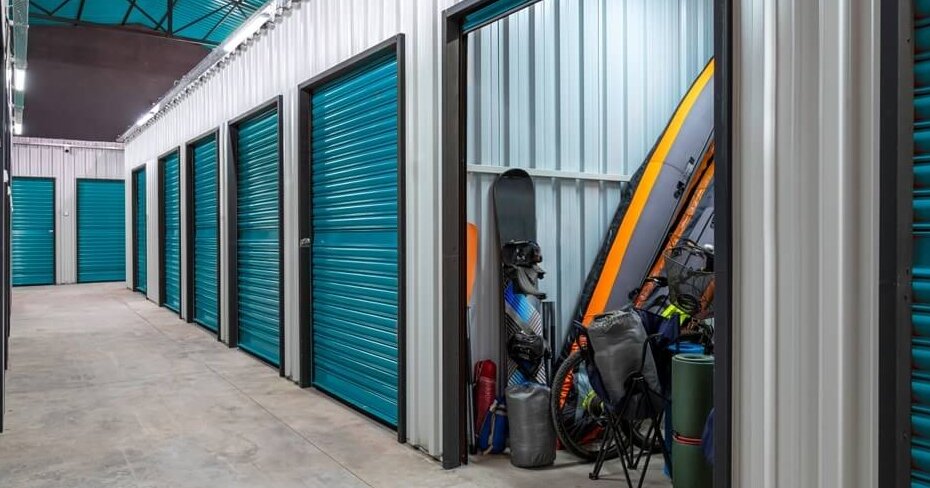How insurance works for self-storage units
By: John Loeppky on May 15, 2025
This article has been updated from a previous version.
Self-storage unit insurance protects your belongings against risks like theft, fire, or water damage while they’re kept in a storage facility. It’s designed to cover items you store temporarily, such as extra furniture or personal keepsakes, offering financial protection if something goes wrong.
Whether you’re moving, downsizing, or just need extra space, having insurance for your storage unit can provide peace of mind.
To help you better understand this type of coverage, here’s a closer look at what it typically includes, how it interacts with other insurance policies you may have, and why it’s worth considering when renting a unit.
In this article:
How does storage unit insurance work?
Storage unit insurance helps protect the items you store in a storage facility from possible risks. Some storage places offer their own insurance plans, acting as a go-between for you and an insurance company. These can be easy to set up, but their coverage might be limited. Other facilities ask you to get your own insurance, similar to how landlords might require you to have renter’s insurance before moving in.
Jim Grant, CEO of Storage Protectors, says it’s important that policy holders go through an insurance broker and be very diligent about what plan they choose. While we often only think about theft as the main peril at play while our belongings are in storage, Grant adds that other perils like fire or water damage are also important to consider.
Related: Tenant insurance safeguards your stuff – and your peace of mind
Your homeowner or renter insurance may provide some coverage
If you already have homeowner’s or renter’s insurance, check if it covers items in storage. Some policies do, but there may be limits or exceptions.
Standard home insurance policies offer some coverage for stored belongings in a self-storage facility. Similarly, if you’re a renter, self-storage units in privately-owned facilities may be covered by tenant insurance.
The caveat is that insurers offer limited coverage for items in self-storage – some cover 10% of your belongings and some, up to and including your entire policy limit.
For example, if your personal property limit is $50,000, you may only be covered for $5,000, while your furniture, household items, and collectibles may be worth much more. Be sure to check with your insurance company on how much may be covered on your home insurance policy when your belongings are in a self-storage unit.
However, if you’re moving or downsizing, you’ll likely need coverage for more than three months, as it may take you some time to find a place and settle down. In this case, you might consider a standalone storage unit insurance policy.
Read more: When buying insurance, should you go with a broker or an agent?
What does storage unit insurance cover?
Storage unit insurance generally protects your belongings from damage caused by events like fire or severe weather. However, it often excludes certain risks, such as damage from pests or natural disasters like earthquakes. Coverage can vary between insurers, so it’s important to carefully review your policy.
To make sure your items are fully protected, speak with your insurance provider to understand what’s included and decide if extra coverage is necessary. For example, high-value items like expensive jewelry or collectibles are often excluded from standard policies and may require additional protection.
“The main thing to consider is the amount of coverage to be sure all your items are covered,” Grant says. “You shouldn’t buy the cheapest policy.”
Taking the time to customize your coverage will help you better protect your items and feel more secure about storing them.
Read next: What’s the best way to insure my engagement and wedding rings?
Should you opt for a separate storage unit insurance policy?
Whether you should opt for a separate policy for your stored goods depends on what you’re storing and how long you intend to keep them stored.
Grant says one key advantage of opting for a separate storage unit insurance (that is, a policy that is independent of your existing tenant, home, or condo insurance), is that it can save you money in the long term by reducing the impact of any claims can make on your home insurance policy.
Your standard home or tenant insurance provides some amount of coverage for your self-storage unit. In other words, they are tied together, and if you have a lot of claims, your home insurance premiums will go up.
Let’s say you’re using your home insurance policy to protect your belongings, and one day, you need to make a claim against it. Your overall home insurance policy will go up in price, instead of just your premiums for the storage unit policy (which would be the case if you opted for a separate policy).
Similarly, if your tenant insurance policy covers your belongings in an associated storage locker within your condo building, it is still to your advantage to check in with your condo building management about how their own insurance impacts your liability.
Make sure the storage facility is safe
If you do decide to opt for a self-storage unit, make sure the storage facility is operating in the safest way possible.
This means verifying that the facility keeps a log of visitors coming in and out, that the building is in good condition, that there are professional-grade security cameras, and that they provide immediate responses to your questions and concerns.
Lastly, be sure to do your due diligence – make sure your belongings are packed and protected against any avoidable perils, like rodents or pests.
It also never hurts to shop around and compare policies offered by different insurance companies to make sure you're getting the best possible coverage for your needs.
Read more: How do home insurance claims affect your rates?
Save 20% on average on home insurance
Compare quotes from 50+ Canadian providers in 3 minutes.


